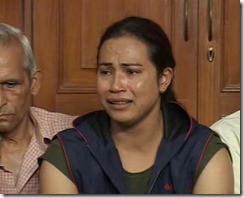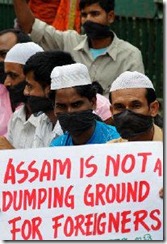Monika Devi has shrugged off a two-year doping ban to emerge as India’s best lifter ahead of the Commonwealth Games
By Rudraneil Sengupta
 Laishram Monika Devi, 28, smiles widely, waving at friends and colleagues passing by the quaint coffee shack opposite the women’s hostel at the Netaji Subhas National Institute of Sports in Patiala. She asks for a strong coffee, ties her hair back with a rubber band, and is ready for the interview.
Laishram Monika Devi, 28, smiles widely, waving at friends and colleagues passing by the quaint coffee shack opposite the women’s hostel at the Netaji Subhas National Institute of Sports in Patiala. She asks for a strong coffee, ties her hair back with a rubber band, and is ready for the interview.
She looks content and happy, which is no mean feat for a woman who, just two years ago, could not stop crying. Her blossoming career as India’s best weightlifter had almost come to an abrupt and scandalous halt just as she was ready for the big stage.
Everything was going well for Monika Devi before the 2008 Beijing Olympics—she had finished 11th in the 2007 Weightlifting World Championship, ensuring her qualification for the Olympics, and in the 2008 Asian Championship she was the only medalist for India.
“I was the only athlete to qualify for weightlifting at the 2008 Olympics,” she says. “I was completely confident. A month before Beijing, I saw the international qualifying results on the Net, and I was up there with the best.”
Then a series of curious incidents followed. The evening before her flight to Beijing, the Indian Weightlifting Federation (IWF) told her over the phone that her journey had been postponed, and they wanted her to come to the federation office in the morning for a felicitation. “I was puzzled by this sudden change in plans,” she says, “but I had no idea what was in store for me.”
She sensed something was wrong the moment she got to the federation office on the morning of 5 August 2008, because there was a large crowd of reporters outside the building.
“When they saw me, they began screaming—‘Tell us about the doping incident! What happened, Monika?’ I was in complete shock. I had no idea how to react,” she says.
What really happened was this—the Sports Authority of India (SAI) sent results of an out-of-competition test to the IWF, declaring that Monika Devi had tested positive for a banned substance. The IWF criticized the report, saying that it had no details about the sample tested or the banned substance that was found, but it had no option but to cancel her trip to Beijing. She broke down in front of TV cameras, protesting her innocence. Manipur chief minister Okram Ibobi Singh rushed to Delhi and asked the Prime Minister’s office to intervene. A few days later, on 9 August, the Indian Olympic Association cleared her name citing irregularities in the report, but conceded that it was too late to send her to the Olympics.
Harbhajan Singh, president of the IWF at the time, confirmed that the weightlifter had gone through 30 tests in 18 months before the Olympics, and that they were all clean.
“That’s what made this result really surprising,” says Singh, “Even though we have faced a lot of doping problems, we were really confident that Devi was clean.”
Monika Devi, meanwhile, quietly left for her home in the village of Nachou in Manipur.
“I slept for days. I was numb with depression,” she says. “My father let me be for a few days, but then started forcing me to get out in the morning and work out.”
For a whole year, she could not put her mind to training, and felt she had lost all focus.
“I’d train for a month, then leave it completely for another month, and reluctantly go back to it for another month,” she says. “It was a terrible time for me, because I thought that I’ll never get out of this rut.”
Her family kept pushing her to keep her in training, and to take her mind off the incident.
“People advised me to emigrate to Australia,” she says. “They said that the training facilities are better there, you’ll become a world beater.”
Monika Devi was almost ready to pack her bags.
But she finally managed to get back into a proper training rhythm in early 2009, and made a conscious decision to rid her mind of all thoughts and conversations of the scandal. “I just felt happy as my strength and focus started coming back to me,” she says.
This is not the end of the doping story though. A special anti-doping disciplinary panel set up to inquire into the doping charges against her got her B-sample results from a Tokyo laboratory in March 2009. It returned positive as well, showing traces of an anabolic steroid that boosts testosterone. Despite this setback, India’s national weightlifting coach Harnam Singh still thinks Monika Devi is innocent.
“Athletes need to use legal strength-building supplements to compete in the top flight,” he says, “but you need to have a really good doctor or nutritionist monitoring exactly what supplements an athlete is taking, but we didn’t have the best advisers then, and we still don’t have it. It’s very easy for an athlete to take a supplement laced with steroids and not know about it.”
The IWF banned her for the mandatory period of two years (given to first-time offenders), but was lenient in starting the ban period from June 2008, the date her positive sample was first tested. This meant that her ban ended in June, giving her a chance to get back into competition for the 2010 Commonwealth Games.
This is something she does not want to talk about. It’s a closed chapter, she says. The Commonwealth Games, she hopes, will put an end to the whole doping saga. She can’t wait for them to begin, to step into the arena and compete again.
“I won silver in the 2006 Commonwealth Games in Melbourne,” she says, “but this time I have the strength to go for gold. My form is peaking again now, and I’m happy with the amount of power I’m generating.”
Her results at the trials for the Commonwealth Games, held last month, back her statement—she came out far ahead of her rivals with a combined lift of 229kg (102kg in snatch, and 127kg in clean and jerk). She hopes she can do better at the Games, because it will be a gift for her father who, in 1996, took a 14-year-old Monika to the SAI training centre in Imphal, introducing her to what would become a lifelong passion.
rudraneil.s@livemint.com
 Nagaon, Sep 4 : While illegal Bangladeshi influx is threatening national security, over 60 lakh infiltrators have been already included in the voters list of Assam, alleged Bharatiya Janata Party (BJP) on Friday.
Nagaon, Sep 4 : While illegal Bangladeshi influx is threatening national security, over 60 lakh infiltrators have been already included in the voters list of Assam, alleged Bharatiya Janata Party (BJP) on Friday.



 Melbourne, Sep 2 : Attacks on Indian students in Australia may have hit their enrolment into varsities here, with new figures showing a slump by almost half.
Melbourne, Sep 2 : Attacks on Indian students in Australia may have hit their enrolment into varsities here, with new figures showing a slump by almost half. 


 New Delhi: The government’s licensing authority for medical drugs has served notices on the Indian scientists involved in the ‘superbug’ study published last month, asking them to explain how they collected samples for the research and transported them abroad.
New Delhi: The government’s licensing authority for medical drugs has served notices on the Indian scientists involved in the ‘superbug’ study published last month, asking them to explain how they collected samples for the research and transported them abroad.




 Mumbai: Under attack from political parties for his comments on Mumbai metro, Bollywood megastar Amitabh Bachchan on Wednesday said that being a "proud Mumbaikar" he never opposed the development of the city.
Mumbai: Under attack from political parties for his comments on Mumbai metro, Bollywood megastar Amitabh Bachchan on Wednesday said that being a "proud Mumbaikar" he never opposed the development of the city. 







